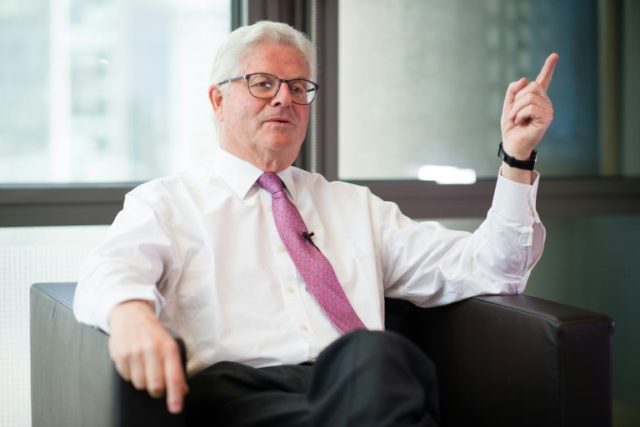London (AFP) – Lloyd’s has seen natural disasters, shipwrecks and revolutions. Now the prospect of Brexit is forcing the historic insurance market to look at contingency plans, its chairman told AFP.
“I still think London would remain a very important financial centre but it would be harder for us to operate,” John Nelson said in an interview at the group’s headquarters in London’s financial district.
“We have contingency plans which we look at very hard but we cannot go so far with those contingency plans until we know what the terms of the exit are.
“We think we have got the right tools in the box to allow us to continue to operate,” Nelson said.
“But the model under which we would do it would not be as efficient as the one we have today.”
British business leaders have warned against a departure from the European Union and the City of London is officially calling for a “Remain” vote in the in-out membership referendum on June 23.
The 68-year-old Nelson outlined the main economic points being made in the lead-up to the vote, commenting: “I think the balance of that argument is pretty clear that this is in the UK’s interest to remain in”.
Smiling behind his large glasses, the silver-haired Nelson speaks proudly of Lloyd’s, a market place for insurers which traces its history back to the late 17th century and has business in some 200 countries.
“We are actually probably in UK terms the most global organisation based in the UK,” said Nelson, a former banker who was appointed Lloyd’s chairman in 2011.
– ‘Wake-up call’ –
Nelson was speaking in the company’s headquarters designed by star architect Richard Rogers in the 1980s with ducts and lifts on the exterior — one of the City’s most iconic landmarks.
Lloyd’s of London last year reported the total value of its written premiums at £26.7 billion pounds (36.8 billion euros, $39.0 billion) through 84 insurance companies based on its four trading floors.
Insurance underwriters sit at desks while brokers go from table to table to negotiate deals from insurance for an oil tanker going around the world, to an oil company worried about its rig or the rocket being developed for space travel by Virgin Galactic.
A reminder of the fragility of global commerce is the large ledger on the main trading floor with a constantly updated list of all the shipwrecks in the world going back to three centuries ago.
The worry now is of a less tangible variety.
Britain is a member of the 28-member EU bloc, and its companies can therefore access the financial services “passporting” regime which allows member states to trade across national borders.
Lloyd’s therefore enjoys easy “passporting” access across the bloc, while it also benefits from EU trade agreements.
It also provides a crucial gateway for international insurance companies to access the rest of the European Union.
“That’s an extremely important facility we have,” Nelson said.
“London is seen as a financial services centre — a very important place for in a sense giving you access to the EU.”
If Britons voted to leave “it would have an impact”.
But a vote to stay could give Britain and the EU “a real fillip”, he added.
“It’s been a wake-up call for all of Europe in terms of particularly the regulatory regime, the competitiveness regime in Brussels and so on.”
The EU referendum debate, he said, was raising the pressure for “getting the EU more efficient and getting it deregulated, more liberalised from a trade and every other point of view”.

COMMENTS
Please let us know if you're having issues with commenting.